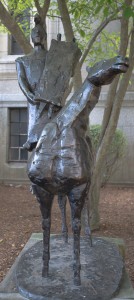
Today with great reverence I wish to thank Dr. Jonas Salk and those who preceded and followed him in the struggle to control polio. For as The Writer’s Almanac for Feb. 23 reminds us:
It was on this day in 1954 that the first mass inoculation of children for polio began in Pittsburgh, Pennsylvania.
For to adapt a phrase from its most famous sufferer, of polio before Dr. Salk there was much more to fear than fear itself.
***
I first encountered the Salk vaccine, I think, a year later. It was a three-shot series. The first two shots in the arm had hurt like hell. My mother had told me to stop by the St. Clairsville Clinic after school to get the third.
I’ve no idea why I’d told my schoolmates what I had to do. It resulted in a day of teasing and pinching and unrelenting reminders of what 3:30 would bring.
I trudged slowly from school to the clinic. I was shown into Dr. Bob Porterfield’s office. I don’t recall what happened next, but seconds later I was flying about the office with the bespectacled, chain-smoking doctor puffing behind.
Somehow he caught me, administered the shot, and I then returned to my paper route with an aching left arm.
I expected something far worse when I got home. But nothing happened, and Dr. Bob never referred to the chase over the next 25+ years when he treated three generations of my family. It was my first experience, I now realise, with doctor-patient confidentiality – and mercy.
***
My gratitude to Dr. Salk in that moment and five years later when I got a booster shot – a memorably painful one – was quite limited. It isn’t today.
Now I think about the family across the street who were quarantined during the summer of 1952. The older son and younger daughter bore signs of their polio ever after, as did the entire family.
My beloved cousin, Anne, contracted polio the year before I was born. She depended on a wheelchair for the next 45 years. As I came to know her in the 1960s, I glimpsed the hard work it took to keep the muscle strength she’d rebuilt. Of polio’s hourly humiliations, there was no way to avoid knowing. It made remarkable the near silence of this powerful, strong-voiced woman about polio’s frustrations.
Beyond their life-long affection for their care in Warm Springs, Georgia, and the support of their fellow patients, Anne shared much with the most famous polio sufferer, Franklin Roosevelt.
Both had contracted the disease as adults. It usually struck children in the summer which made for their parents anxious – not carefree – seasons.
***
Polio, we’ve learnt from Joni Mitchell’s experience, is not something one gets over. It can return with a vengeance, as it did with my cousin. It is unrelenting which makes the fears of my parents and their peers all the more tangible.
The Writer’s Almanac reports something I don’t remember (I was 8 ½):
On April 12, 1955, the monitors of the [Pittsburgh] test held a press conference…: the vaccine was safe and effective. The announcement was a huge national event. Stores broadcast the event on loudspeakers, and judges even stopped trials in the middle so that everyone could listen. After they heard the news, churches across the country rang their bells, factories took a break for a moment of silence, and spontaneous celebrations broke out all over the country. It was 10 years to the day after the death of Franklin Roosevelt.
According to the Salk Institute website:
In the two years before vaccine was widely available, the average number of polio cases in the U.S. was more than 45,000 [in a population of 165 million]. By 1962, that number had dropped to 910. Salk never patented the vaccine, nor did he earn any money from his discovery, preferring to see it distributed as widely as possible. [Link added.]
***
So, thank you to Dr. Robert Porterfield, Dr. Jonas Salk, the March of Dimes and the millions who worked hard to remove the fear of polio from parents. And, thank you to the survivors of the more than 30 anti-polio campaigners killed in Pakistan by the Taliban since July 2012.
For as Dr. Salk said, ‘Our greatest responsibility is to be good ancestors.’
Recent Comments